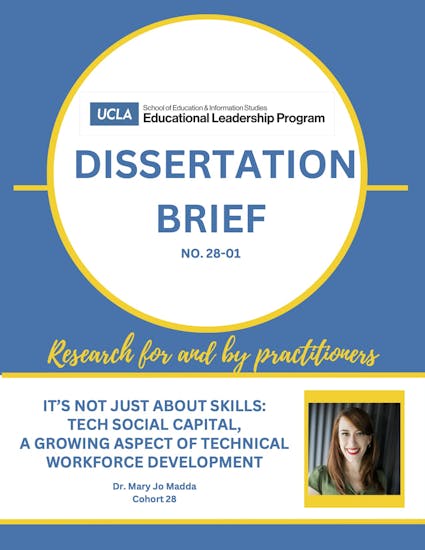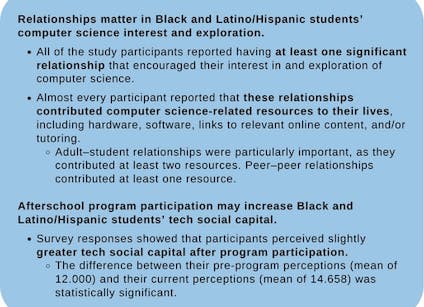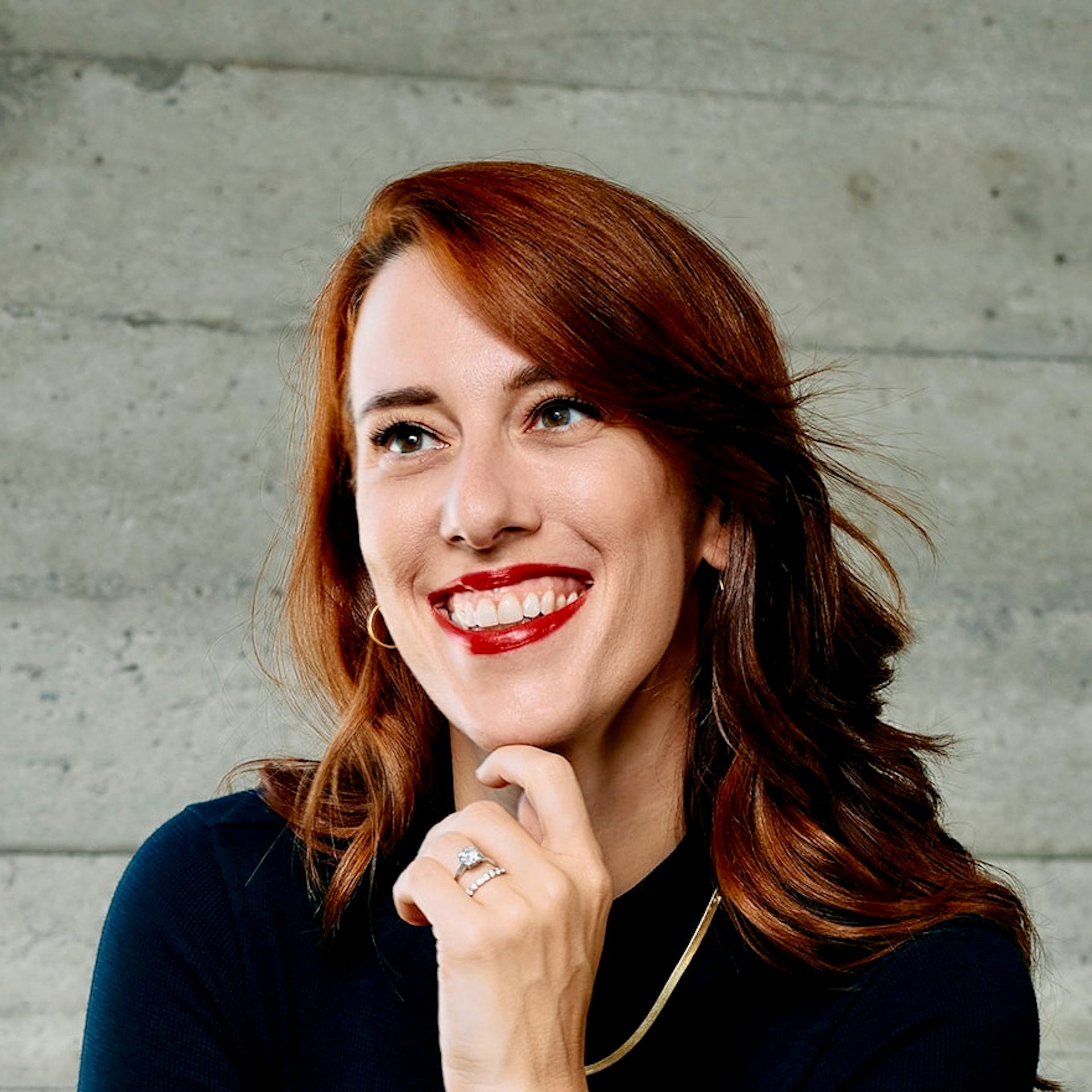“It’s Not Just About Skills: Tech Social Capital, a Growing Aspect of Technical Workforce Development”
Mary Jo Madda began her career as a teacher and administrator. She then became a journalist, and now is the senior program manager on the Education for Social Impact team at Google. Madda has significant training, knowledge and skills, but has come to believe that maybe who she knows is as important as what she knows in making those career transitions.
“I’ve realized that so much of my ability to make those jumps was because of the people I knew, and the resources I was able to access through those relationships,” Madda acknowledges. “I’m fascinated by the connections between people’s relationships and the outcomes they lead to.”
At Google, Madda works on Code Next, a project founded by Black and Latino/Hispanic Googlers who felt that the tech sector needed to do more for Black and Latino/Hispanic students. To open access and encourage participation in computer science and the technology sector, they felt the tech world needed to help students develop relationships and connections, they had a responsibility to offer students of color opportunities to grow and develop their social capital.
Madda had been interested in pursuing a doctoral degree in education but wanted to take part in a quality program where she could continue her work at Google. She was also intent on participating in a program with a strong focus on social justice, and where she could learn from and collaborate with others in a cohort of students. In 2020, right in the middle of the COVID-19 pandemic, she enrolled in the Education Leadership Program at the UCLA School of Education and Information Studies. Building on her interest in the effects of relationships, she began digging into research on social capital. In 2023, Madda earned a doctoral degree from the program, completing her dissertation, “Tech Social Capital in Black and Latino High School Communities: A Growing Aspect of Computer Science Education and Workforce Development.”

Madda’s research acknowledges that computer science education has increasing value in preparing students for the developing workforce, but contends that computer science education too often focuses on hard skill development, overlooking the value of interpersonal networks and other related resources that may be referred to as social capital. A summary of her research is highlighted this spring in the Education Leadership Program Dissertation Brief series.
Madda’s study explored Black and Latino/Hispanic high school students’ experiences in an afterschool computing program, paying particular attention to the development of their “tech social capital.” To conduct the study, Madda interviewed 20 Black and Latino high school students participating in the Code Next program. Those interviews informed the adaptation of a quantitative survey given to 88 students regarding their pre-program and current relationships and resources.
Highlighting the potential of afterschool programs to help develop students’ social capital, the research finds that relationships matter in the computer science interest and exploration of students, and that participation in such programs may increase the tech social capital of Black and Latino students. Importantly, Madda contends that a single relationship can add multiple resources to a student’s life.

“One of my favorite findings is that the multiplicative nature of relationships is fundamental to understanding the difference between the ‘bridging’ type of bond of social capital and ‘bonding’ social capital,” Madda says. “One of the major differences between bridging and bonding social capital is whether there is more focus on individuals (bonding) or more focused on acquiring previously inaccessible resources (bridging). And I think what I learned was, as much as it’s wonderful to introduce someone to a number of different individuals, sometimes what’s even more impactful is if you introduce them to one individual that has access to a variety of different resources. One connection, multiple resources.”
As an example, Madda highlights the experience of a student who met a librarian who not only gave the student access to 3-D printers, but also showed them how to use them and understand the programming behind them.
“This librarian gave this student access to 3-D printers during and after school hours, and then she would also teach and tutor her, providing her opportunities to ask questions and things like that. And while that seems pretty basic, here’s a teacher that’s both giving the student access to this technology and also supporting them and tutoring them. You could argue that that is a multiplicative relationship because this student acquires more than one resource through this singular connection,” Madda says.
Madda’s research also underscores the importance of familial relationships and the need to avoid deficit thinking. Every student in the study reported having at least one significant relationship with a family member that encouraged their computing journey.
“When I did my landscape analysis, one of the things I noticed was a lot of the research out there doesn’t really consider family relationships – we’re talking parents, grandparents, relatives, and close family friends — as social capital, or just does so casually without actually thinking about what a student has to bring to the table,” Madda said. “I think the thing that really made me excited was the significance of those relationships. In most of the cases with the students that I interviewed and surveyed, those individuals provided the initial push or inspiration that got students interested in computer science education.”
“Additionally, even though their parents or guardians or friends may not have had experience or connections, the resources they provided to the students were motivation and connections to opportunities,” she added. “ A lot of the students talked about how someone in their family saw an ad for a program and said, ‘Hey, I think you should do this.’ I think it underscores the fact that the deficit mindset, especially around students of color, is completely false, and that most of the students came into the computer science education space because of relationships they had prior to that engagement.”
Madda contends that educators and others in learning environments have an opportunity to help develop students’ tech social capital and her dissertation brief offers recommendations for practitioners. Those recommendations focus on connecting students with institutional agents and resources, understanding how to work better with families, and intentionally building and measuring relationships.
“I would like people to consider the idea of trying one or two tactics they believe can help increase the social capital for whatever kinds of learners are in their community,” Madda says. “I’d also encourage folks to review the survey I assembled and think about how they could produce and use something similar in their communities. Give their students a survey at the beginning of the year and the end of the year, and then look at the data and analyze it, and think about it.”
Madda is following her own advice – running her survey a second time with more students in the Code Next program, seeking to validate her research and to understand the differences between students studying in person and those working online.
“The UCLA Education Leadership Program gave me the opportunity to deepen my research expertise,” Madda says. “Before ELP, I didn’t think of myself as an academic, but now I feel more confident in my ability to parse through research and conduct quantitative studies. Even if I don’t choose to go back into teaching or administration, having ELP in my background gives me a well-rounded level of expertise to handle a lot of what goes on in the K-12 Space.”
###
Madda’s dissertation brief, “It’s Not Just About Skills: Tech Social Capital,
a Growing Aspect of Technical Workforce Development” is available online on the ELP website here.
